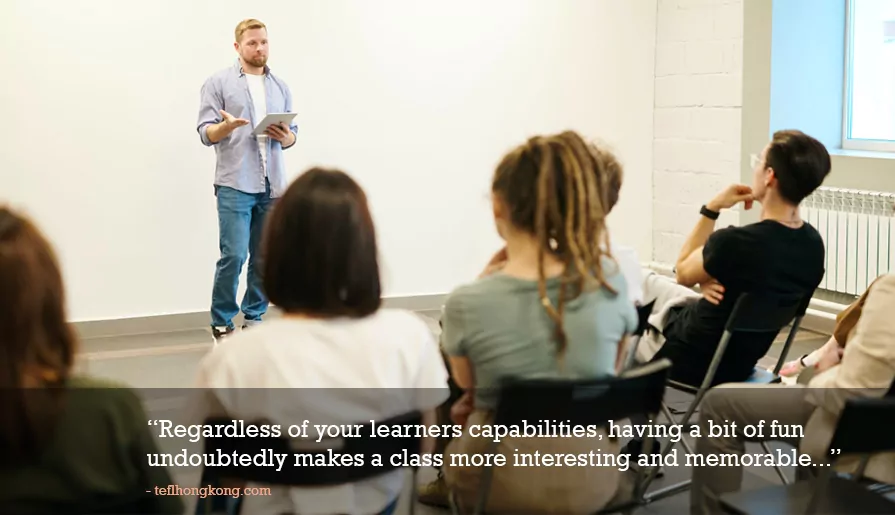
- By: Anna McIver
- In: Teaching Adults
At times teaching advanced students can be a daunting prospect for ESL teachers. Especially if students are preparing for a certification course or need to pass an exam for work, or to continue their studies.
Although some English teachers struggle with planning and teaching for beginners, others find higher-level classes trickier. Some teachers don’t feel ready to teach the highest levels or aren’t sure where to begin. These are some of the most common concerns we will aim to address below.
In this article, we will provide some useful guidance on how to manage these worries and ensure that you feel prepared, and your students can make progress.
So, how to go about planning classes for advanced groups?
Don’t assume you can pick up the coursebook and teach! Always make sure you have a plan!
With many higher-level classes, the grammar and vocabulary used are genuinely complex. Just because you are a native speaker, or have an ESL certification doesn’t mean you will understand it the moment you open a textbook.
You will need to consider how to present new ideas to the class and also ensure you are prepared for questions regarding how to use grammar in context too.
Be realistic with the time it will take to introduce, teach and then practice a new idea with advanced classes. This may be very different from what you are used to with lower-level groups.
Similarly, you will need to provide opportunities to go back and review content so that students are less likely to forget new ideas. This can easily be done with homework tasks or warmer activities in the following lesson, which links back to the previous classwork.
When planning, use the course book, study guide or online content if it is available to you. If not, don’t reinvent the wheel. The internet has a whole range of useful, accurate and free material for ESL teachers of all levels. Always ensure you read through documents or presentations before using them and check for any errors before using new content.
We suggest the following as a starting point for online material:
https://www.flo-joe.co.uk/ – particularly useful for classes studying for Cambridge exams with example answers and tasks provided.
http://film-english.com/blog/ – with short lesson plans all linked to films in some way, this is a fun site which you can use now and again to brighten up your grammar classes.
What about the games?
Games are appropriate at all levels and for all ages. Interactive activities create a fun and relaxed atmosphere. They are often excellent tools for enhancing ideas, encouraging more speaking and of course a bit of healthy competition.
When students are at an advanced level, the options for games become much broader. Our favourites for learners progressing onto upper intermediate and advanced courses include:
- Taboo: Use vocabulary related to the course for this fun vocabulary enhancing game
- Scattegories: Adapted from the popular board game, all students are given a set of categories such as food, countries, sandwich fillings (anything goes!) etc., and are given a letter of the alphabet. Under timed conditions, they must complete one item for each category.
- Advanced hangman or Pictionary: These always go down well and can become pretty challenging.
- Newspaper article vocab game: Students are provided with a newspaper article with words either missed out which they must complete or with words highlighted that they must provide synonyms for.
- Phrasal verbs bingo: Bingo can be used for almost any grammar topic and is a great way to review.
Regardless of your learners capabilities, having a bit of fun undoubtedly makes a class more interesting and memorable for the students as well as the teacher.
What else should I consider for my advanced students?
At times, ESL teachers forget the importance of pronunciation and intonation. Your advanced students need help and activities to practice these just like they did when they first started to learn English as a second language.
Easy ways of helping students with these areas are to use ‘real-life’ materials like radio programmes, podcasts, clips from TV shows or films and so on. This allows students to experience a range of accents, lots of different types of English spoken around the world and also to begin to get to grips with the speed at which native speakers talk.
Course books do, of course, provide audio for use in class. Still, there is a lot to be said for using a range of listening resources. Hence, students have additional access to spoken English.
Don’t forget that many advanced speakers may be going to live, work or study in English speaking countries. Hence, as ESL teachers of this level, it is significant to prepare them as best we can for real day to day life.
Also read: How to help “Speical-students” make them feel more confident.
Conclusion: So, to conclude, when faced with an advanced level class, there is no need to feel overwhelmed. Although it can be challenging to start with, when you get into the swing of it and get to know your class and the content, your teaching higher-level classes are a lot of fun.
If you are stuck for ideas or not sure how to present an idea, why not reach out to colleagues? They may have faced the same difficulty and be able to share their experience as well as some guidance.
Don’t be afraid to ask for help as you get used to teaching advanced learners. As always we wish you the best of luck with your ESL teaching journey, and for suggestions and guidance on other topics feel free to have a read other articles too.
Please Share:This article was originally published on July 13, 2020 and was last updated on August 30, 2021.
Courses We Offer:

1. CertTESOL: Certificate in TESOL
A level 5, initial teacher training qualification for new and experienced teachers, enabling you to teach English anywhere in the world. The course is equivalent to Cambridge CELTA.
Learn More
Developed by our Trinity CertTESOL experts, for a comprehensive, self-paced learning experience. Earn an internationally recognized certificate and master essential teaching skills, accessible globally 24/7.
Learn More